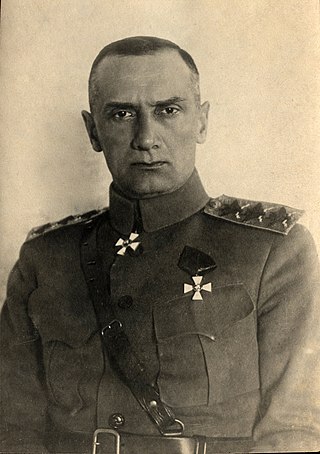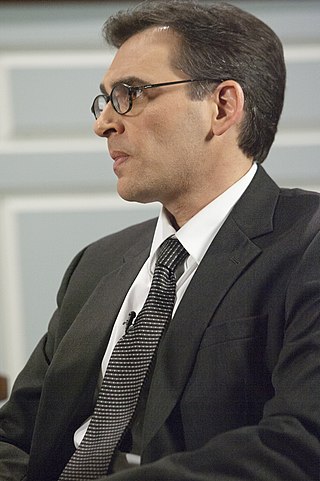Related Research Articles

The Russian Civil War was a multi-party civil war in the former Russian Empire sparked by the overthrowing of the social-democratic Russian Provisional Government in the October Revolution, as many factions vied to determine Russia's political future. It resulted in the formation of the Russian Socialist Federative Soviet Republic and later the Union of Soviet Socialist Republics in most of its territory. Its finale marked the end of the Russian Revolution, which was one of the key events of the 20th century.

The Chairman of the Joint Chiefs of Staff (CJCS) is the presiding officer of the Joint Chiefs of Staff (JCS). The chairman is the highest-ranking and most senior military officer in the United States Armed Forces and the principal military advisor to the president, the National Security Council, the Homeland Security Council, and the secretary of defense. While the chairman of the Joint Chiefs of Staff outranks all other commissioned officers, the chairman is prohibited by law from having operational command authority over the armed forces; however, the chairman assists the president and the secretary of defense in exercising their command functions.

General Jehangir Karamat is a retired four-star rank military officer, diplomat, public intellectual, and a former professor of political science at the National Defense University. Prior to serving as a Chief of Army Staff, he also served as the 9th Chairman of the Joint Chiefs of Staff Committee from 1997 to 1998.

Grigory Mikhaylovich Semyonov, or Semenov, was a Japanese-supported leader of the White movement in Transbaikal and beyond from December 1917 to November 1920, a lieutenant general, and the ataman of Baikal Cossacks (1919). Semyonov was also a prominent figure in the White Terror. U.S. Army intelligence estimated that he was responsible for executing 30,000 people in one year.

In the field of military theory, the operational level of war represents the level of command that connects the details of tactics with the goals of strategy.

The Allied intervention in the Russian Civil War consisted of a series of multi-national military expeditions that began in 1918. The initial impetus behind the interventions was to secure munitions and supply depots from falling into the German Empire's hands, particularly after the Bolsheviks signed the Treaty of Brest-Litovsk, and to rescue the Allied forces that had become trapped within Russia after the 1917 October Revolution. After the Armistice of 11 November 1918, the Allied plan changed to helping the White forces in the Russian Civil War. After the Whites collapsed, the Allies withdrew their forces from Russia by 1925.

The American Expeditionary Force, Siberia was a formation of the United States Army involved in the Russian Civil War in Vladivostok, Russia, after the October Revolution, from 1918 to 1920. The force was part of the larger Allied North Russia intervention. As a result of this expedition, early relations between the United States and the Soviet Union were poor.
John Erickson, FRSE, FBA, FRSA was a British historian and defence expert who wrote extensively on the Second World War. His two best-known books – The Road to Stalingrad and The Road to Berlin – dealt with the Soviet response to the German invasion of the Soviet Union, covering the period from 1941 to 1945. He was respected for his knowledge of the Soviet Union during the Cold War. His Russian language skills and knowledge gained him respect.

The Joint Chiefs of Staff Committee (JCSC), ; is an administrative body of senior high-ranking uniformed military leaders of the unified Pakistan Armed Forces who advises the civilian Government of Pakistan, National Security Council, Defence Minister, President and Prime minister of Pakistan on important military and non-military strategic matters. It is defined by statute, and consists of a Chairman, the military chiefs from Army, Navy and the Air Force: all four-star officers appointed by the President, on the advice of the Prime minister. The chairman is selected based on seniority and merit from the Chiefs of service of the three branches of the Pakistan Armed and Defense Services. Each service chief, outside their Joint Chiefs of Staff obligations, performs their duty directly for the Ministry of Defence.

Geoffrey Till is a British naval historian and emeritus Professor of Maritime Studies in the Defence Studies Department of King's College London. He is the Director of the Corbett Centre for Maritime Policy Studies.
Eelam War I is the name given to the initial phase of the armed conflict between the government of Sri Lanka and the LTTE.
Brian James Bond is a British military historian and professor emeritus of military history at King's College London.
Major General Edward Bailey Ashmore, was a British Army officer from the 1890s to the 1920s who served in the Royal Artillery, the Royal Flying Corps and briefly in the Royal Air Force before founding and developing the organisation that would become the Royal Observer Corps.
Colin S. Gray was a British-American writer on geopolitics and professor of International Relations and Strategic Studies at the University of Reading, where he was the director of the Centre for Strategic Studies. In addition, he was a Senior Associate to the National Institute for Public Policy.

Taras Kuzio is a Professor of Political Science at the National University of Kyiv-Mohyla Academy. His area of study is Russian and Ukrainian political, economic and security affairs.

Mikhail Vasilyevich Frunze was a Soviet revolutionary, politician, army officer and military theorist. Born to a Romanian father and a Russian mother in Russian Turkestan, Frunze attended the Saint Petersburg Polytechnical University and became an active member of the Russian Social Democratic Labour Party (RSDLP). Following the RSDLP ideological split, he sided with Vladimir Lenin's Bolshevik faction. He led the textile workers strike in Ivanovo during the 1905 Russian Revolution, for which he was later sentenced to death before being commuted to life-long hard labour in Siberia. He escaped ten years later and took active part in the 1917 February Revolution in Minsk and the October Revolution in Moscow.

Alexander Vasilyevich Kolchak was a Russian admiral, military leader and polar explorer who served as Supreme Ruler of Russia from 1918 to 1920 during the Russian Civil War. Previously, he served in the Imperial Russian Navy and fought in the Russo-Japanese War and World War I.

Richard H. Shultz, Jr. is an American scholar of international security studies. He is a Professor International Politics at The Fletcher School of Law and Diplomacy, Tufts University, where he is also the director of the International Security Studies Program (ISSP).

Michael Scott Neiberg is an American historian who specializes in 20th-century military history.
Brian Holden-Reid is a British military historian.